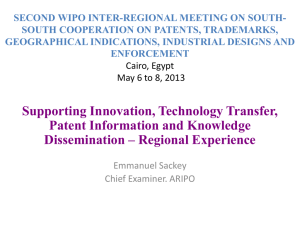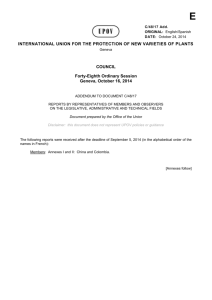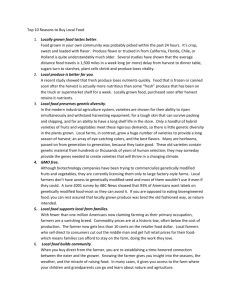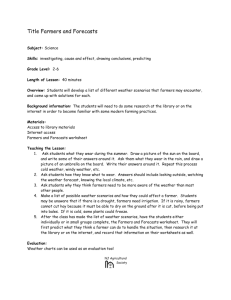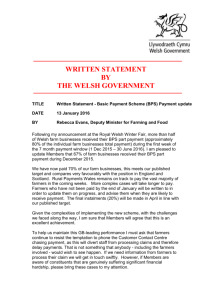detailed comments
advertisement
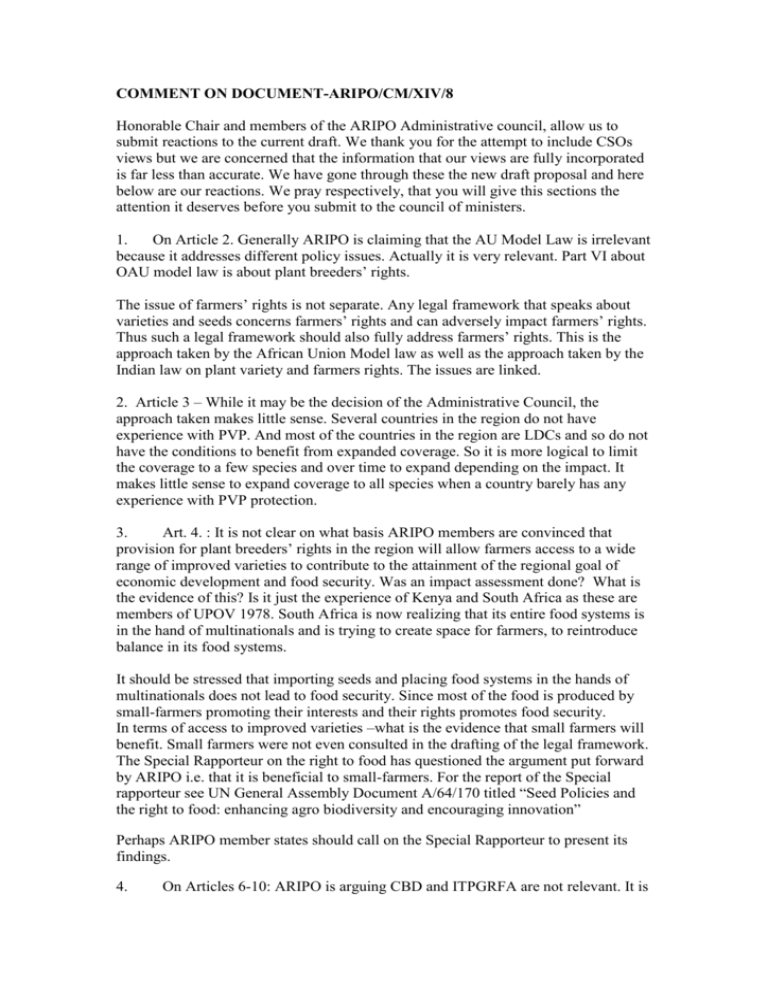
COMMENT ON DOCUMENT-ARIPO/CM/XIV/8 Honorable Chair and members of the ARIPO Administrative council, allow us to submit reactions to the current draft. We thank you for the attempt to include CSOs views but we are concerned that the information that our views are fully incorporated is far less than accurate. We have gone through these the new draft proposal and here below are our reactions. We pray respectively, that you will give this sections the attention it deserves before you submit to the council of ministers. 1. On Article 2. Generally ARIPO is claiming that the AU Model Law is irrelevant because it addresses different policy issues. Actually it is very relevant. Part VI about OAU model law is about plant breeders’ rights. The issue of farmers’ rights is not separate. Any legal framework that speaks about varieties and seeds concerns farmers’ rights and can adversely impact farmers’ rights. Thus such a legal framework should also fully address farmers’ rights. This is the approach taken by the African Union Model law as well as the approach taken by the Indian law on plant variety and farmers rights. The issues are linked. 2. Article 3 – While it may be the decision of the Administrative Council, the approach taken makes little sense. Several countries in the region do not have experience with PVP. And most of the countries in the region are LDCs and so do not have the conditions to benefit from expanded coverage. So it is more logical to limit the coverage to a few species and over time to expand depending on the impact. It makes little sense to expand coverage to all species when a country barely has any experience with PVP protection. 3. Art. 4. : It is not clear on what basis ARIPO members are convinced that provision for plant breeders’ rights in the region will allow farmers access to a wide range of improved varieties to contribute to the attainment of the regional goal of economic development and food security. Was an impact assessment done? What is the evidence of this? Is it just the experience of Kenya and South Africa as these are members of UPOV 1978. South Africa is now realizing that its entire food systems is in the hand of multinationals and is trying to create space for farmers, to reintroduce balance in its food systems. It should be stressed that importing seeds and placing food systems in the hands of multinationals does not lead to food security. Since most of the food is produced by small-farmers promoting their interests and their rights promotes food security. In terms of access to improved varieties –what is the evidence that small farmers will benefit. Small farmers were not even consulted in the drafting of the legal framework. The Special Rapporteur on the right to food has questioned the argument put forward by ARIPO i.e. that it is beneficial to small-farmers. For the report of the Special rapporteur see UN General Assembly Document A/64/170 titled “Seed Policies and the right to food: enhancing agro biodiversity and encouraging innovation” Perhaps ARIPO member states should call on the Special Rapporteur to present its findings. 4. On Articles 6-10: ARIPO is arguing CBD and ITPGRFA are not relevant. It is also arguing that “Studies have shown that there has been no loss of diversity in a range of crops in different countries.” CDB objective is as follows: “The objectives of this Convention, to be pursued in accordance with its relevant provisions, are the conservation of biological diversity, the sustainable use of its components and the fair and equitable sharing of the benefits arising out of the utilization of genetic resources, including by appropriate access to genetic resources and by appropriate transfer of relevant technologies, taking into account all rights over those resources and to technologies, and by appropriate funding.” Issues concerning conservation of biological diversity, fair and equitable sharing of resources are very important in the context of plant variety protection. If PVP only promotes genetically uniform varieties, then this will leave to erosion of biodiversity. ITPGRFA is also very important to PVP issues. Article 6 speaks about the sustainable use of plant genetic resources for food and agriculture including measures such as (a) pursuing fair agricultural policies that promote, as appropriate, the development and maintenance of diverse farming systems that enhance the sustainable use of agricultural biological diversity and other natural resources; (c) promoting, as appropriate, plant breeding efforts which, with the participation of farmers, particularly in developing countries, strengthen the capacity to develop varieties particularly adapted to social, economic and ecological conditions, including in marginal areas; (d) broadening the genetic base of crops and increasing the range of genetic diversity available to farmers; (e) promoting, as appropriate, the expanded use of local and locally adapted crops, varieties and underutilized species; (f) supporting, as appropriate, the wider use of diversity of varieties and species in onfarm management, conservation and sustainable use of crops and creating strong links to plant breeding and agricultural development in order to reduce crop vulnerability and genetic erosion, and promote increased world food production compatible with sustainable development; Article 9 of ITPGRFA speaks about realizing Farmers’ Rights, as they relate to plant genetic resources for food and agriculture. Farmers rights include the right to save, use, exchange and sell farm-saved seed/propagating material. The proposed draft legal framework is inconsistent with the abovementioned elements. As for erosion of biodiversity – it is should be noted that the Special Rapporteur on the Right to Food Olivier DeSchutter has noted that the spread of commercial varieties has accelerated crop diversity erosion. About 75% of plant genetic diversity has been lost as farmers worldwide have abandoned their local varieties for genetically uniform varieties. Genetic diversity within crops is also decreasing. Widescale genetic erosion increases vulnerability to climate change, new pests and diseases. 5. On Article 6.2/Art 25 – ARIPO is arguing that the CBD and ITPGRFA pursue different objectives, have different scopes of application and require different administrative structure to monitor their implementation and therefore those matters should be addressed in separate legislation, although such legislation should be compatible and mutually supportive. It should be argued that the objectives that should be pursued by the proposed legal framework must promote achievement of the objectives of the CBD and ITPGFRA. They are all interlinked and closely connected and do not address different subject matters. The current proposed legal framework does not promote but undermines the objectives of CBD and ITPGRFA. 6. On Article 12, ARIPO is arguing that GMO regulation should be separate. Actually the PVP framework must be supportive of the GMO regulation. By this it means that PVP should not be granted if the GMO variety is not approved for circulation. This ensures coherence in national law. The approach proposed by ARIPO does not create coherence in national legislation. ARIPO does not respond to the issue on disclosure of origin. Including it in the draft legal framework will ensure coherence with CDB and ITPGRFA objectives. It is important to have disclosure of origin in the PVP law so that it is effective in that no PVP is granted if the right holder does not disclose the necessary details of the origin of the material, prior informed consent and benefit sharing. If it is not included in the PVP law, then the right holder will get its PVP right although it fails to provide full disclosure. Including it in the PVP law is important to incentivize the right holder to provide accurate information on the issue of disclosure. 7. On Article 15, the approach taken by ARIPO is flawed. ARIPO is stating that information on the breeding history, genetic origin and the origin of the plant material used in the breeding of the variety would be required to be provided where this facilitates the examination of the variety. Confidential information will only be published with the consent of the breeder. Since the breeder is receiving protection for a certain period of time, there is no logic to allowing the breeder to hide behind confidentiality. Breeder should make all information publicly available including the parent lines it is using. See the argument made in the civil society submission. 8. On Article 16- ARIPO argues national treatment. National treatment is about treating foreigners and locals equally. CSOs have not argued that foreigners should be treated differently from locals. CSOs are calling for fees to be waived for NGOs/farmer communities (irrespective of foreign or local). CSOs are also calling for longer period for pre-grant opposition. ARIPO is talking about nullification and cancelation after the grant has been made while CSOs are talking about opposition before the grant is made. The issue of environment needs to be addressed within the PVP regulation so that protection is not granted to varieties that are injurious to the environment. 9. On Article 21 – In the explanation, ARIPO makes reference to UPOV 1978. This reference is confusing since what is or is not allowed by UPOV 1978 is simply irrelevant since new members cannot join UPOV 1978. Under UPOV 1991, there are restrictions to innovating around existing varieties. This is clearly stated in the proposed legal framework in Article 22(1)(iii) which states: Exceptions to breeders’ rights - “acts done for the purpose of breeding other varieties except where the provisions of Article 21 (4) apply, acts referred to in Article 21(1) to (3) in respect of such other varieties”. Article 21(4) introduces the concept of “essentially derived variety” which is effectively a variety predominantly derived from the protected variety and retains the expression of the essential characteristics that result from the genotype or combination of genotypes of the protected variety. Article 21 further clarifies- that Essentially derived varieties may be obtained for example by the selection of a natural or induced mutant, or of a somaclonal variant, the selection of a variant individual from plants of the initial variety, backcrossing, or transformation by genetic engineering. So what this means is that further breeding by farmers using the protected variety is going to be limited. If the breeding efforts lead to an essentially derived varieties (EDVs) breeders’ rights will extend to EDVs. From this it is not accurate to say that UPOV 1991 allows innovating around existing varieties, because the room to innovate around existing varieties is extremely limited in comparison to what is provided by the AU Model law and by UPOV 1978. 10. On Article 22 - ARIPO states that it will ensure, in the development of the regulations that the situation of small holder farmers will be taken into consideration in relation to farm saved-seed, in consultation with the Member States. On farm-saved seeds this is what the draft legal framework states: “(2) Notwithstanding Article 21, for the list of agricultural crops and vegetables with a historical common practice of saving seed in the Contracting States specified by the Administrative Council of Plant Variety Protection which shall not include fruits, ornamentals, other vegetables or forest trees, the breeder’s right shall not extend to a farmer who, within reasonable limits and subject to the safeguarding of the legitimate interests of the holder of the breeder’s right, uses for propagating purposes, on his own holdings, the product of the harvest which he has obtained by planting on his own holdings, the protected variety or a variety covered by Article 21(4) (a) (i) or (ii). (3) The conditions for the implementation of the provisions under paragraph (2), such as the different level of remuneration to be paid by small scale commercial famers and large scale commercial farmers and the information to be provided by the farmer to the breeder, shall be stipulated in the implementing Regulations.” What the above means is that for specific agricultural crops that is specified by the Administrative Council of Plant Variety Protection when using the protected variety a farmer will be able to use farm saved seeds only on his own holdings. The qualifications are “within reasonable limits and subject to the safeguarding of the legitimate interests of the holder of the breeders’ right” . But this limited exception may be subject to “different level of remuneration” (i.e. payment of royalties by farmers”. Also farmers will be asked to provide information to the breeder on their use of farm saved seeds. In Europe this has led to harassment by breeders of small farmers and requiring farmers to give information is the subject of court battles. Under this exception farmers will not be allowed to exchange or sell farm-saved seeds even in their local markets. There are many innovative ways of protecting breeders rights and ensuring that farmers rights are also protected, for e.g. Section 39 of the Indian Protection of Plant Varieties and Farmers’ rights (PPVFR) 2001 allows farmers to save, use, sow, re-sow, exchange share or sell his farm produce including seed of a variety protected under the legislation “in the same manner as the law was entitled before the coming into force” of this legislation, with the condition that the seeds farmers are entitled to sell cannot be branded. This protects the interests of the breeder as well as the farmer. Articles 30-31 of the AU Model Law also has interesting provisions that balances breeders’ and farmers rights. But ARIPO has just ignored these innovative approaches simply because it wishes to join UPOV 1991. 11. Article 24 – CSO arguments make sense as some specificity is needed for an effective law. 12. Article 28, 29, 38 – ARIPO’s argument is quite misleading in that it suggests that it is not encroaching on national rights. Firstly – the ARIPO office has full authority to grant breeders’ rights and to administer such breeders’ rights on behalf of the Contracting States. Once an application is filed in the ARIPO office and granted, it is automatically applicable to all ARIPO member states. ARIPO has full authority to grant compulsory license, nullify and cancel the PBR. This is basically countries giving away their sovereign rights to ARIPO with regard to PVP matters. See Articles 4, 24, 28 and 29 of the proposed legal framework. Then in Article 38, it states “This Legal Framework shall be without prejudice to the right of the Contracting States to grant national plant breeders rights for plant varieties, subject to the provisions of Article 40”. This means that countries can have separate legal frameworks for granting PBRs for plant varieties. But this is subject to regulations that will be made by the Administrative Council – see Article 40. Further in Article 39, it states that if a right holder obtains regional protection for a variety, then the national protection granted to that same variety will not be applicable. Overall the CSO argument that countries are giving up the sovereign right to regulate PVP still stands. As shown above the authority for varieties protected through the regional system, the authority to regulate and administer rights rests with the ARIPO office and not with national authorities. This is further reinforce by Article 37 which states that regional breeders’ rights may not be granted, transferred or terminated otherwise than on a uniform basis. This has significant implications for the national interests of each member state. Effectively it prevents member states from taking any individual action with regard to PVP even if it is a matter of significant national interest. According to the legal framework any decision pertaining to PVP will be made by the ARIPO office or the Administrative Council. This has great implications for the sovereignty of ARIPO member states. What is being proposed is extremely problematic as it denies member state the right to make any decision concerning PVP even when it concerns national interests. Each ARIPO member state is at a different level of development and may wish to adopt different strategies with regard to balancing farmer seed systems and breeders’ rights. However as the legal framework is currently drafted it denies individual member states the right to take decisions that are in their interests. All decisions will be made by the ARIPO office or the Administrative Council. 13. Under General Comments, ARIPO raises a number of points with regard to benefits of joining UPOV. It refers to countries such as China, Brazil, Argentina, Canada, Japan, Kenya, Poland, Republic of Korea and South Africa. Firstly it is important to point out that except for Japan, Korea and Poland – all of the countries mentioned are NOT members of UPOV 1991. They are members of UPOV 1978 which is a more flexible regime compared to UPOV 1991 in many respects. But today new members cannot join UPOV 1978. Secondly there is no comparison between the mentioned countries and ARIPO members simply because 12 out of 18 ARIPO members are the poorest countries in the world. The conditions that exist in Japan, Korea, Brazil, Argentina, Canada and Poland simply do not exist in these poor countries. Third each of these countries began with a very limited PVP regime which has evolved over time as socio-economic conditions improved and professional breeding industry developed. But in the case of ARIPO, countries are being asked to jump into the deep end when most of the farming is still subsistence farming and poverty is prevalent. It is too simplistic to conclude that without joining UPOV breeding will be limited. Actually the vast biodiversity that exist today has been in the absence of application of UPOV. ARIPO is referring to benefits that have been obtained by joining UPOV. But ARIPO has not examined and explored other innovative approaches to PVP that have been adopted by countries such as India, the AU Model law. What would be the impact of these frameworks? ARIPO’s approach to PVP is too simplistic. It is going for the UPOV model based on claims made by the UPOV Secretariat. It has not looked at the conditions prevailing in countries, examined the agricultural needs and farmers interests in the region. There is no empirical evidence being presented or impact assessment that has been done that provides an independent assessment of the different PVP approaches and the impact on the region. Submitted to the ARIPO Administrative Council on 26th November 2013 by CSOs representing the following organizations: Alliance for Food Sovereignty in Africa (AFSA) Food Sovereignty Ghana (FSG) La Via Campesina (LVC) Food Rights Alliance Uganda (FRA) Eastern and Southern Africa Smallholder Farmers Forum (ESAFF)
